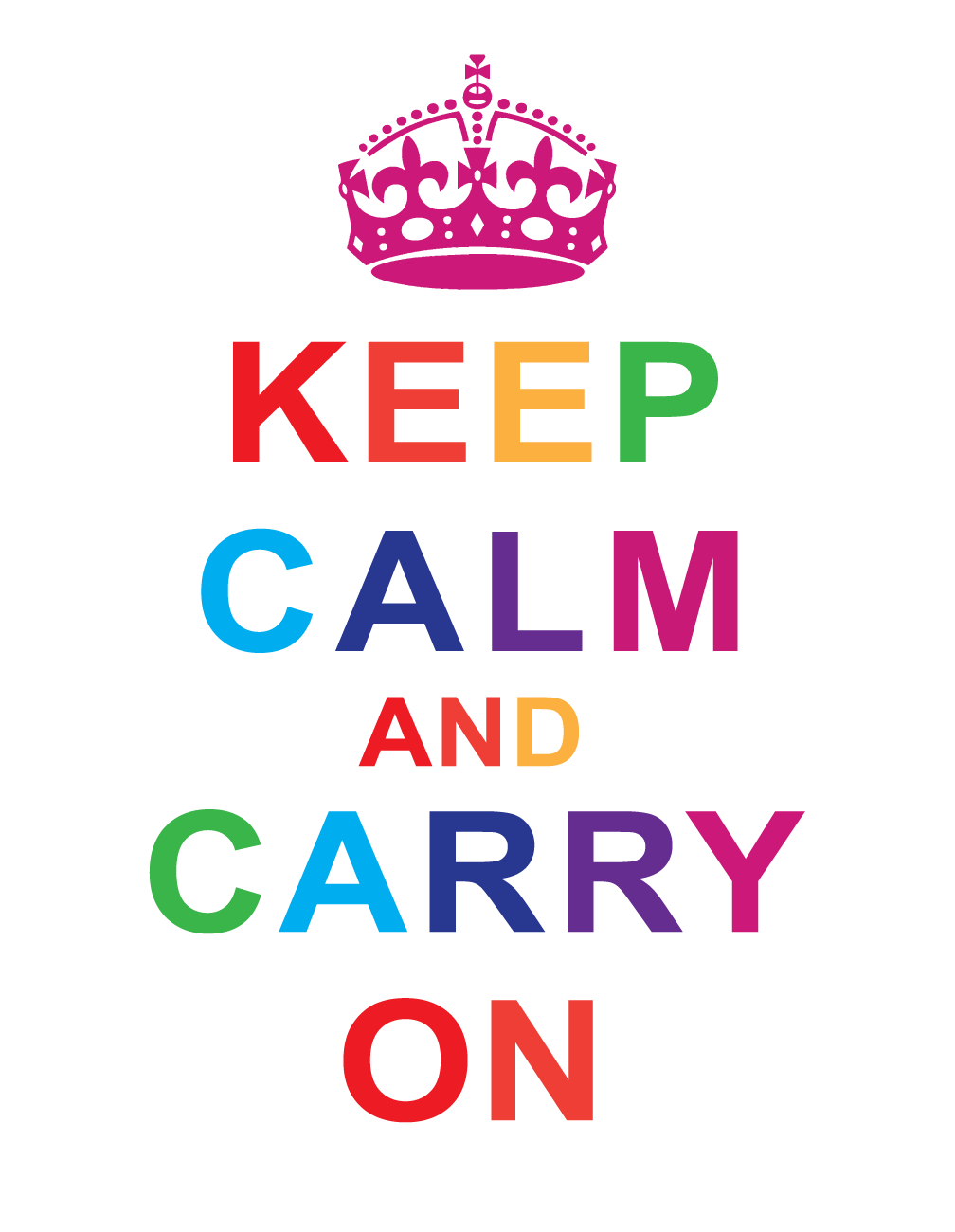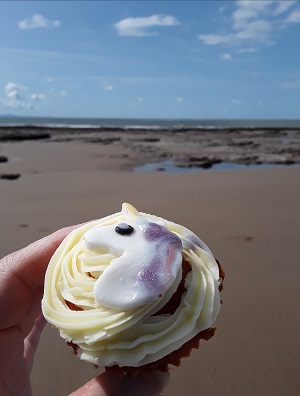When I say to people that I was in counselling and therapy for ten years, they are often surprised. "You are the last person I would have thought needed therapy!" they exclaim. "That's because I've done it," I reply.
I was just as surprised myself, though, when I read in her post on Instagram that the talented and lovely Nadiya Hussain - winner of Great British Bake Off 2015 (and a former Open University student), also struggles with difficult days. Depression can strike anyone.
As a young woman, and particularly as a student, I experienced bouts of unbearable depression and anxiety - so unbearable that I was suicidal.
By depression I mean a blanket of despair that would fall over my life. I would not know what had brought it on, seemingly out of nowhere I would be precipitated into a state of such extreme anxiety and sadness that I could barely concentrate on getting dressed, never mind my studies. What makes depression so particularly difficult is that you don't know what caused it. If your bike is stolen or you hurt your leg and aren't able to get out and about, you know why you feel upset. If you don't know why you are distressed, you can't figure out any way to make things better. You can't say: "I will get a new bike on my employers' Cycle to Work scheme," or "I will be better in a couple of weeks." You don't know when or how the depression will strike - your life is in thrall to inexplicable and life-threatening mood swings. Since you don't know what the problem is, you can't fix it; you're facing a life that might always be dominated by bleak misery. You sometimes think the only solution is to end it all.
I was also crippled by a lack of confidence. Everything I did was rubbish because I was rubbish, ergo I could not have done anything cool or smart. By the age of 20 I was studying at Cambridge University, I had written a few novels, I had run some great projects raising money for Oxfam and organised a public display about my home town's unusual local history. I was a beautiful, friendly and kind-hearted young woman. But if anyone tried to tell me how amazing I was, I dismissed them as an idiot. Obviously I was stupid, ugly and unlikeable - that was the basis on which my universe was built. As it was a founding principle in my life, it was extremely difficult to dig it up and put in something sound on which to build happiness.
Now I am OK. I often feel sad or angry or frustrated - when that happens, I know why. I often also feel happy and good about myself. I even sometimes feel relaxed Even at my lowest, I can make a plan and prioritise what to do.
Practical tips
If you are in a state of mental distress, be gentle and patient with yourself. Just do as much as you can; keep going.

(Image from quotesgram.com)
- Take care of your physical health: go to the doctor, dentist, opticians if you need to;
- Eat well and drink plenty of water;
- Cut out caffeine.
I am on my fourth day now of only one cup of tea in the morning and am fed up of decaff coffee and Rooibos tea - but it's nice to have a good night's sleep, not wake up at 4 am panicking in case I forgot to set up a life-saving thread in my Student Forums. (These things can usually wait a couple of days, and sometimes the students do it for themselves which is good for them and me
)
- Prioritise your family and 'me' time.

(My daughter made this cake)
- Get into a routine.
To balance out the highs and lows of emotional life, I find it helps to get into a dull predictable routine about the cleaning. (Also, this keeps my small home reasonably bright which makes me feel better too.) I clean on Mondays and Thursdays, and now I prioritise this above my work (yes, that is the reason you rarely get a reply to your email before 10 am on those days, and sometimes not til 3 in the afternoon). Whatever is going on in life, there is always a pile of washing up by the sink. Restoring some small sense of order to the chaos of my home makes me feel more in control.
When signed up to a module, I also prioritise my studies above my work. I put in between half an hour to two hours in the morning when my daughter has set off to school, before I switch on my work email. It feels like a small island of 'me' time before I start responding to the slew of email requests to take part in university consultations on alarming new changes to our working patterns.
Loneliness, good friends and affectionate pets.
See friends regularly. Although my budget is tight, I plan trips out - sometimes to livecast events in the cinema rather than the theatre, which costs more.
If you are alone most of the time, you might consider taking in a pet. (If you are not yet very good at taking care of other things as well as yourself, the counsellor in the film 28 Days suggests starting with a pot plant.)
Prof. Martin Weller has written very affectingly about the recent loss of a dog he adopted. His poignant account shows how love and loss are two sides of a coin. He gave a lot of support and kindness to an unwanted rescue dog - Bruno repaid him with unquestioning love and affection during a tough time in his life.
We have two cats. Because I work alone from home, it's nice that they are around snoozing on armchairs and sometimes coming to ask me for food. They never look down their noses at me (well, unless I buy really inferior cat food) or tell me to fill in forms which are a waste of time and effort. If I go out to hang out the washing they come out with me - the Pride on the move together through the suburban savanna 🦁🐱🐱
Counselling, therapy and medication
Consider getting professional support. If you broke your leg, you would go to a doctor. If your spirit has been wounded, you should go to a counsellor. Depending on your circumstances, medication may help too - talk to your GP about this. You should also talk to your GP if you have other odd symptoms - when I went through a period feeling drained of energy I thought at first it was depression, but it proved to be an undiagnosed fibroid.
Students may be able to access counselling support from the Student Minds organisation. Your GP, and Student Support Team, might also have details of organisations which could help you. If you are in work, your employer may have confidential support you could draw on.
Larger employers will have a staff counselling scheme in place. My colleagues may be surprised to hear that we Associate Lecturers are entitled to access the Open University's scheme. This includes not only a telephone service for immediate support, they will set up six free sessions either on the phone or face to face to help you through a difficult time. (These can be extended if you are in great need.)
For a number of reasons, we ALs are under particular stress and strain at the moment. This time of year is one of high pressure as new modules start teaching out. Our contracts are heavily casualised and over the summer we wait to hear if we still have teaching on some modules, or have gained new teaching on others which we applied to. This year, the ten year negotiations on our permanent contracts seem to be finally reaching a conclusion. Not only are we highly anxious that this may not happen (again), and worried in case if it does happen it will turn out to be a pig in a poke. Sudden good fortune can de-stabilise people's lives. We feel discombobulated by the whole process.
I am also personally affected by the loss of my mother at the start of the summer, only four months ago. When I found I was getting unreasonably irritated with the cats and my daughter (although I did restrain my temper and not actually shout at any of them ), I started to phone the Union's counselling support line (they have one too). Then I went to the university to ask for more regular support. I was pleasantly surprised when they offered me six face to face sessions. Working at a distance learning institution, the most I expected was something regular on the phone. They did warn me it might take a few days to find someone in my vicinity, but in fact someone phoned back within the hour to offer me sessions five minutes bike ride from my house . (I live in a city; it may not be so convenient if you are living in a rural location.)
I find it frees up my mind to know I have got 50 minutes each week in which to off-load my concerns.
A therapist once said to me, she couldn't give me the answers, only I knew those, but she could come with me on the journey looking for them. That was so comforting - I didn't really want somebody else's answers, just some kindness once a week while I thought things through.
Financial worries
There are also counsellors who will work with you on your money. I don't mean debt counsellors, although if you are in financial difficulties then why not look for someone with whom to talk through your money worries. I mean people like Alvin Hall, whose books on family and money I found insightful.
If you just don't have very much money, it can be even more difficult to get loans and credit cards and you may get charged more for the privilege of being 'seduced' in the market economy - as we describe it on the DD102 module. (We use Bauman's concept of the seduced and repressed, among others, to understand inequalities in current society.)
A possible solution is credit unions. Some employers like local councils will set these up for their employees, or there may be one in your local area. I was going to ask if the university could set one up for us Associate Lecturers, when I discovered that they already have one. This Snowball article (AL newsletter - link is not publicly accessible) explains how ALs can access the OU credit union.
Expect happiness in unexpected places
I had a difficult time in my 40s: experiencing persistent discrimination and bullying, and debilitated by the undiagnosed fibroid. When I hit 50, I realised I had not got into a brilliant career and indeed was mostly stuck at home taking care of a child and cleaning floors - work which my PhD had not skilled me up for. I was old, I was 'past it'.
I also realised I did not have to spend hours writing articles for research journals which hardly anyone would read, as I didn't have a career for which I needed publications. Instead I could focus on my teaching - which I really enjoy. I read Homer's Iliad, as I finally decided I was too old to care if enjoying epic verse is pretentious. I baked cakes. I often run off to the beach with my friends and my child.

Life's a Beach at 50
I wish I could go back and tell the 20 year old me and even the 40 year old me that one day, I would be this happy. I did hope I would be, so I stuck it out through the tough times. I'm glad I did.